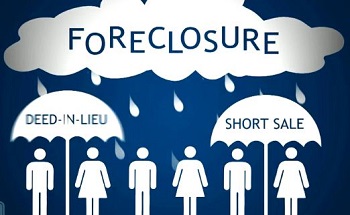A Deed in Lieu of Foreclosure
 What is a deed in lieu of foreclosure? A deed in lieu of foreclosure is a deed instrument in which the borrower conveys all interest in a real property to the lender. It satisfies a loan that is in default and avoids foreclosure proceedings.
What is a deed in lieu of foreclosure? A deed in lieu of foreclosure is a deed instrument in which the borrower conveys all interest in a real property to the lender. It satisfies a loan that is in default and avoids foreclosure proceedings.
The deed in lieu of foreclosure offers several advantages to both the borrower and the lender. The principal advantage to the borrower is that it immediately releases him/her from most or all of the personal indebtedness associated with the defaulted loan. The borrower also avoids the public notoriety of a foreclosure proceeding. The borrower may receive more generous terms than he/she would in a formal foreclosure.
What Is a Deed in Lieu of Foreclosure?
Another benefit to the borrower is that it hurts his/her credit less than a foreclosure does. Advantages to a lender include a reduction in the time and cost of a repossession. It may lower risk of borrower revenge (metal theft and vandalism of the property before sheriff eviction). The borrower may have an additional advantage if he subsequently files for bankruptcy.
Any junior liens make a deed in lieu a less attractive option for the lender. The lender may not proceed with a deed in lieu of foreclosure if the debt of the borrower exceeds the current fair value of the property. The lender will likely not want to assume the liability of the junior liens from the property owner. Accordingly, the lender will prefer to foreclose to clean the title.
To be considered a deed in lieu of foreclosure, the real estate transferred must secure the indebtedness. Both sides must enter into the transaction voluntarily and in good faith. The settlement agreement must have total consideration that is at least equal to the fair market value of the conveyed property.
Jingle Mail
Remember “jingle mail” where the owner gives up and mails the keys to the bank? Lenders will often not act upon jingle mail unless they receive a written letter that states the owner enters into negotiations voluntarily.
The borrower or the lender may not proceed with the deed in lieu of foreclosure until reaching a final agreement.
Short Sales vs. A Deed in Lieu of Foreclosure
Because short sales and deeds in lieu are similar transactions, many people get them confused.
A short sale occurs when a homeowner sells his or her home to a third party for less than the total debt remaining on the mortgage. With a short sale, the lender agrees to accept the proceeds from the sale in exchange for releasing the lien on the property.
Most homeowners who complete a short sale will face a deficiency judgment, though a few states disallow deficiencies after short sales.
Remember, with a deed in lieu of foreclosure, you are conveying the property to the lender, and the deficiency amount is the difference between the fair market value of the property and the total debt. In most cases, completing a deed in lieu will release the borrowers from all obligations and liability under the mortgage, but this is not always the case.
Terra Firma Property Solutions, LLC is a professional, full-service real estate solutions firm.
We buy and sell properties throughout the greater Kansas City area. We specialize in buying distressed homes, then renovating and reselling them to home buyers and landlords. Terra Firma Property Solutions: excited to be part of the economic rejuvenation of Kansas City and its surrounding areas.
Call us today at (816) 866.0566
